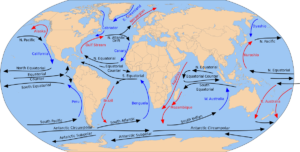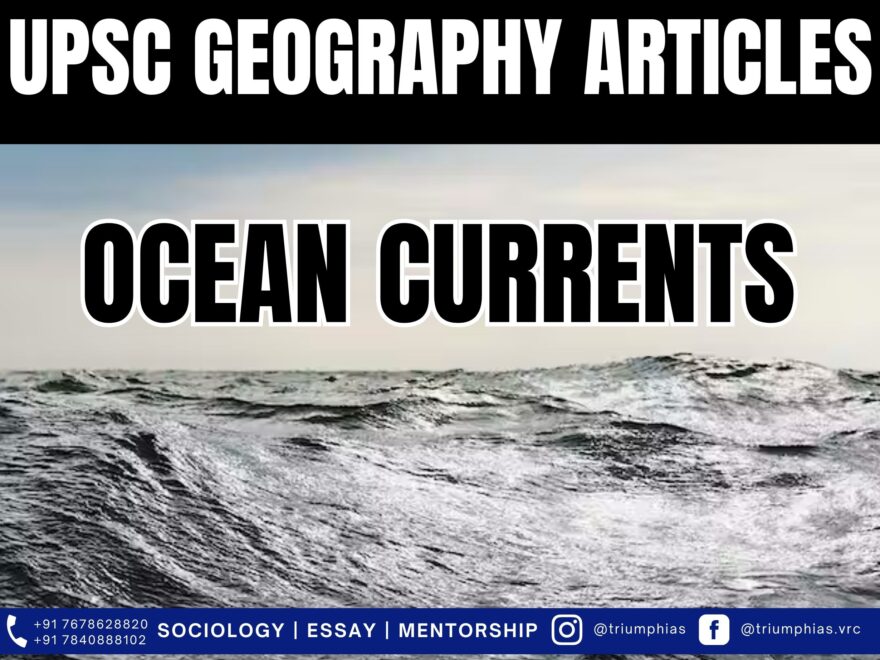Ocean Currents
(Relevant for Geography Section of General Studies Paper Prelims/Mains)

Ocean Currents
Ocean currents represent the perpetual flow of water within the ocean, akin to aquatic counterparts of rivers. These currents adhere to established trajectories, mirroring the presence of rivers within the oceanic expanse. Oceanic currents are classified into two well-defined systems—the surface circulation, which agitates the upper stratum of the ocean, and the deep circulation, which courses through the depths of the sea floor.
Ocean Currents and Their Causes:
Ocean currents are instigated by a confluence of factors, including wind patterns, disparities in water density due to temperature and salinity discrepancies, gravitational forces, and occurrences like earthquakes or storms.
- Influence of Gravity: Surface currents within the ocean are primarily driven by global wind systems powered by solar energy. Additionally, Coriolis forces resulting from the Earth’s rotation intersect with these currents. Role of
- Planetary Winds: The arrangement of surface currents is dictated by the prevailing wind directions. The interaction of surface wind-driven currents with geographic features also produces upwelling currents, which then give rise to deepwater currents.
- Density Variation: Another determinant of ocean currents is the variance in water density due to temperature and salinity differences, leading to thermohaline circulation. This mechanism propels water masses through the ocean’s depths, carrying essential elements like nutrients, oxygen, and heat.
- Unforeseen Events: Geophysical incidents such as powerful storms and underwater earthquakes possess the capacity to initiate significant ocean currents, causing the movement of water masses toward shorelines and shallower areas. Earthquakes may also trigger rapid downslope shifts of water-soaked sediments, creating potent turbidity currents.
- Influential Topography: When a wide-ranging current is funnelled into a confined space, its strength can intensify markedly. On the ocean floor, water masses channelled through narrow gaps in ridge systems or around seamounts can give rise to currents of greater magnitude than those found in the surrounding waters. This phenomenon has implications for the distribution and abundance of marine organisms and for the endeavours of scientists studying them, along with their equipment.
The ocean currents act as the global conveyor belt and thus play a dominant role in determining the climate of many of Earth’s regions.
Sample Question for UPSC Sociology Optional Paper:
Q 1: “How do ocean currents impact the social and economic activities of coastal communities?”
Answer: Ocean currents influence fish migration patterns, which directly affect the livelihoods of fishermen. They also play a role in the climate of coastal regions, thereby affecting agriculture and tourism.
Q 2: “What role do ocean currents play in global inequality?”
Answer: Ocean currents can have varying effects on different regions, influencing climate and therefore agricultural productivity, which can contribute to economic disparities between nations.
Q 3: “Discuss the sociological implications of thermohaline circulation.”
Answer: Thermohaline circulation affects global climate, which in turn impacts food security, migration patterns, and economic stability, thereby having broader sociological implications.
Related Blogs …
To master these intricacies and fare well in the Sociology Optional Syllabus, aspiring sociologists might benefit from guidance by the Best Sociology Optional Teacher and participation in the Best Sociology Optional Coaching. These avenues provide comprehensive assistance, ensuring a solid understanding of sociology’s diverse methodologies and techniques.
Ocean currents, surface currents, deep circulation, thermohaline circulation, wind patterns, water density, temperature, salinity, gravitational forces, climate change, marine ecology, Coriolis forces, Ocean currrents
Choose The Best Sociology Optional Teacher for IAS Preparation?
At the beginning of the journey for Civil Services Examination preparation, many students face a pivotal decision – selecting their optional subject. Questions such as “which optional subject is the best?” and “which optional subject is the most scoring?” frequently come to mind. Choosing the right optional subject, like choosing the best sociology optional teacher, is a subjective yet vital step that requires a thoughtful decision based on facts. A misstep in this crucial decision can indeed prove disastrous.
Ever since the exam pattern was revamped in 2013, the UPSC has eliminated the need for a second optional subject. Now, candidates have to choose only one optional subject for the UPSC Mains, which has two papers of 250 marks each. One of the compelling choices for many has been the sociology optional. However, it’s strongly advised to decide on your optional subject for mains well ahead of time to get sufficient time to complete the syllabus. After all, most students score similarly in General Studies Papers; it’s the score in the optional subject & essay that contributes significantly to the final selection.
“A sound strategy does not rely solely on the popular
Opinion of toppers or famous YouTubers cum teachers.”
It requires understanding one’s ability, interest, and the relevance of the subject, not just for the exam but also for life in general. Hence, when selecting the best sociology teacher, one must consider the usefulness of sociology optional coaching in General Studies, Essay, and Personality Test.
The choice of the optional subject should be based on objective criteria, such as the nature, scope, and size of the syllabus, uniformity and stability in the question pattern, relevance of the syllabic content in daily life in society, and the availability of study material and guidance. For example, choosing the best sociology optional coaching can ensure access to top-quality study materials and experienced teachers. Always remember, the approach of the UPSC optional subject differs from your academic studies of subjects. Therefore, before settling for sociology optional, you need to analyze the syllabus, previous years’ pattern, subject requirements (be it ideal, visionary, numerical, conceptual theoretical), and your comfort level with the subject.
This decision marks a critical point in your UPSC – CSE journey, potentially determining your success in a career in IAS/Civil Services. Therefore, it’s crucial to choose wisely, whether it’s the optional subject or the best sociology optional teacher. Always base your decision on accurate facts, and never let your emotional biases guide your choices. After all, the search for the best sociology optional coaching is about finding the perfect fit for your unique academic needs and aspirations.
To master these intricacies and fare well in the Sociology Optional Syllabus, aspiring sociologists might benefit from guidance by the Best Sociology Optional Teacher and participation in the Best Sociology Optional Coaching. These avenues provide comprehensive assistance, ensuring a solid understanding of sociology’s diverse methodologies and techniques. Sociology, Social theory, Best Sociology Optional Teacher, Best Sociology Optional Coaching, Sociology Optional Syllabus.
Best Sociology Optional Teacher, Sociology Syllabus, Sociology Optional, Sociology Optional Coaching, Best Sociology Optional Coaching, Best Sociology Teacher, Sociology Course, Sociology Teacher, Sociology Foundation, Sociology Foundation Course, Sociology Optional UPSC, Sociology for IAS,
Follow us :
🔎 https://www.instagram.com/triumphias
🔎https://www.youtube.com/c/TriumphIAS
https://t.me/VikashRanjanSociology
Find More Blogs
|
Scope of the subject and comparison with other social sciences |
|||
|
|
|
|
Modernity and social changes in Europe |

